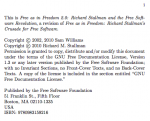Any books?
- Login o registrati per inviare commenti
Any books with a good overview of free software? The history and philosophy of it. Not completely a programming book but maybe with laymans explanations. Also with examples of where proprietary software has been used to exploit people etc.
Not a book as such, but the information you're looking for can be found here:
http://gnu.org/philosophy/
There are a number of books that may be of interest:
* 'Free Software Free Society' by Richard Stallman (2002, much of the same content as above but in print form)
https://shop.fsf.org/books-docs/free-software-free-society-selected-essays-richard-m-stallman-3rd-edition
* 'Information liberation Challenging the corruptions of information power' by Brian Martin (1998)
http://www.bmartin.cc/pubs/98il/
* 'Achieving Impossible Things with Free Culture and Commons-Based Enterprise' by Terry Hancock
http://freesoftwaremagazine.com/articles/making_the_impossible_happen_the_rules_of_free_culture/
A list of other book on software freedom, open source development, democratic management, commons ownership, and related topics, can be found here:
https://www.coactivate.org/projects/disintermedia/notable-books/
>Free Software Free Society
Good one. I remember reading this other one, and deciding after some 40 pages I would never again use any proprietary software on a computer that I have control upon ->
https://archive.org/details/faif-2.0
That was the magic book that influenced me a lot back at the time.
I too would be fascinated to ready anything along these lines. There are a couple of books mentioned here:
https://www.cnbc.com/2018/04/11/andrew-yang-wants-to-run-for-president-promising-free-cash-handouts.html
* 'The War on Normal People: The Truth About America's Disappearing Jobs and Why Universal Basic Income Is Our Future Hardcover' by Andrew Yang (2018)
* 'Raising the Floor: How a Universal Basic Income Can Renew Our Economy and Rebuild the American Dream' by Andy Stern (2016)
I'm not sure if either book explicitly mentions software freedom, or the potential of UBI to allow people to write free code software fulltime.
I'm hopeful that there's a genuine bi-partisan consensus on UBI merging in the US, and hopefully around the world. Yang is basically a Silicon Valley venture capitalist, whose politics tend towards the "small government", anti-tax wing of US politics, while Stern is a unionist, whose politics tend to be exactly the opposite.
I'm not a USAmerican buddy ;) Just commenting on the fact that those two books on UBI come to the same conclusion, despite being written by people who would usually tend to have opposing views on US economic policy.
I can speak about my own country, Aotearoa (NZ), which is heavily influenced by US/UK political thinking. People here are increasingly aware of the UBI concept, and I've had conversations with members of parliament who will say privately that they think UBI is inevitable, but that it will take another decade or so to become politically realistic.
For now, a lot of people still scoff at the idea of "giving away free money". They are stuck on the idea of money as a finite commodity (like oil), something that needs to be hoarded and fought over. Here's an example of this woolly thinking about money:
https://blog.erratasec.com/2018/03/what-john-oliver-gets-wrong-about.html
Graham knows what he's talking about when it comes to computer security and crypto, but his stories about how money works are total fairy tails. If you're interested, here is a book you can read online, explaining how money actually works in practice today:
http://neweconomicperspectives.org/modern-monetary-theory-primer.html
Another way to think about money is as a commons, a suite of open protocols for the mutually-beneficial exchange of resources within societies. In that way of thinking, denying people access to money is like denying them access to the internet. It doesn't mean there's more for everyone who does have access, it means that they miss out on things that could have been contributed by those who are denied access.
Free software Free Society 3 (Stallman)
https://www.gnu.org/doc/fsfs3-hardcover.pdf
Free as in Freedom (Sam Williams)
https://sagitter.fedorapeople.org/faif-2.0.pdf

Seven Levy: "Hackers -- Heroes of the Computer Revolution"
Others have recommended FAIF. I think this is an excellent choice.
> Also with examples of where proprietary software has been used to exploit
> people etc.
The GNU site has a section all about user rights violations.
https://www.gnu.org/proprietary/
I've been thinking of writing a book as a practical guide to living life
without proprietary software. Over time, I've realized that living with
your user rights intact requires significant lifestyle changes, and I'd
like to lay them out in a comprehensive and easy to understand way, so
people don't have to struggle as they go along.
Subjects:
- Telephony
- Email
- Chat
- Data storage
- Photos
- Navigation
- Taxes
- Money
- TV
- Movies
- YouTube
- Twitch
- Shopping
- Jobs
- Dating
You're a genius! It would be much easier for average persons.
I would include a bit of philosophy and history too. I'd be very grateful if I can help you with something.
I initially read a book entitled "After the Software Wars" and learned some history.
Frankly, why I joined the free software community in the very beginning was that I wanted to learn how to run proprietary software on GNU/Linux. I once even planned to remove any copyleft part of GNU/Linux to make it a fully proprietary operating system...
- Login o registrati per inviare commenti

